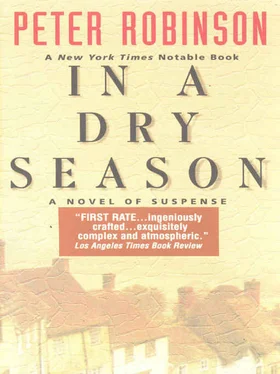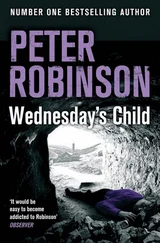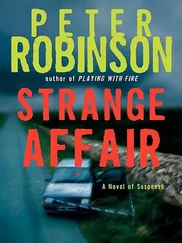She was willing enough to go into the field with him. He hadn’t planned to hurt her; he had only seen her flashing her legs for him on the road back there and wanted a piece, like any normal guy would. But she had shown no patience with him and his little problem – it happened sometimes when he’d been drinking – and she had asked him for money. That made him see red. Literally see red. The knife? Yes, he usually carried a knife with him. A habit from the farm days back in Iowa when he used to whittle pieces of wood.
The third woman, back Stateside in 1949, he didn’t really remember at all, and of the second one in England, all he remembered was something red happening in a barn. Again, it was the drink. Konig’s daddy had been a vicious alcoholic who regularly beat poor Edgar to within an inch of his life; his mother was a drunken whore who’d do it with anyone for a dime. All his life the drink had caused his problems; it made him do these evil things, and then he had the bad luck to be caught on that highway in California.
So went Edgar Konig’s story.
The drink. Vivian looked at her glass, then, with a shaking hand, she poured herself another tumbler of gin and grasped a fistful of ice cubes from the bucket on the bedside table, tossing them in the glass carelessly, so a little gin splashed on the table. An American habit she had picked up, that, ice in her drink.
It was almost time.
Edgar Konig, just turned seventy-six, was finally getting what he deserved. Vivian still felt a twinge of guilt when she realized that Banks was right, that she might have helped put an end to his killing all those years ago, after Gloria, the very first victim. She was partly responsible for Konig’s feeling that he led a charmed life of murder without consequence.
She had tried to rationalize it to herself so many times since Banks told her what had happened and turned his back in scorn that evening when the storm broke at Hobb’s End. Even if she had reported what happened, she told herself, they would have still probably arrested Matthew. He wasn’t well enough to face that sort of treatment. Though Banks was a little easier on her when they spoke the next day, she could still feel his censure, and it stung.
But what could she have told the police that would have pointed them specifically toward Edgar Konig? The whiskey and Lucky Strikes on the kitchen counter? They were hardly evidence. Gloria could have got them anywhere, and they could have been lying there on the counter for a couple of days. She and Gloria had known plenty of American air force officers in the area, and she had no reason at the time to suspect any of them of murder. It was all very well for Banks to say in retrospect that she was responsible for all those deaths, that she could somehow have stopped all this had she acted differently, but it wasn’t fair. Twenty-twenty hindsight. And who wouldn’t, given the chance, go back and change something?
Time.
The first shock would boil his brain and turn all the nerve cells to jelly; the second or third shock would stop his heart. His body would jerk and arch against the straps; his muscles would contract sharply, and a few small bones would probably snap. Most likely the fingers, the fingers he had used to strangle Gloria.
If he didn’t have a leather band strapped across his eyes, the heat would cause his eyeballs to explode. The death chamber would be filled with the smell of burning hair and flesh. Steam and smoke would puff out from under the hood. The hood itself might catch fire. When it was over, someone would have to turn on an air vent to get rid of the stench. Then a doctor would come, pronounce him dead, and the public would be informed.
Besides, Vivian told herself as she watched the people chanting outside the prison gates, others could have stopped him, too, if the system had worked properly. It wasn’t only her fault. She had acted only from the purest of motives: love of her brother. These past few weeks, she had read all the articles on Edgar Konig and his impending doom. There had been plenty of them.
Konig had finally been caught in California in the late sixties, when he was about forty-five, attacking a young female hitchhiker by the side of a lonely road. Fortunately for her, another motorist had happened along. Even more fortunate, this man wasn’t the kind who scared easily or who didn’t want to get involved. He was an ex-serviceman, and he was armed. When he saw a woman in trouble, he stopped and managed to disarm and disable Konig before calling the police. Already the girl was unconscious from strangulation. She had five stab wounds, but she survived.
Konig served nine years of a fourteen-year sentence. He was released early because of good behavior and prison overcrowding. A lot of people in the know opposed his release, regarding him as extremely dangerous and suspecting – but never being able to prove – his involvement in at least four murders. The prison officials said there wasn’t much else they could do at the time but let him go.
After his release in the late seventies, for years Konig was driven from one community to another as people found out what he was, trying to get work as a store clerk, more often than not failing and going on welfare. Just a few years ago he had finally settled in the small Florida town where it all came to a messy and predictable end.
His neighbors had already started protesting, and one local business had even offered him money to up sticks and move elsewhere. But Konig stayed on. Then, one day, a couple of Jehovah’s Witnesses came to call and saw, through the screen door, Konig with a knife in his hand standing over the body of a woman, who turned out to be a local prostitute. They called the police on their mobile phone. Konig was drunk; he offered no resistance. After that, of course, came the obligatory years of waiting for trial, for sentencing, the failed appeals, death row.
And it was all over now. A cheer went up from the crowd outside the prison. News had come out. Edgar Konig was dead.
Why was it that Vivian felt no relief, felt nothing but the stirrings of a bad headache? She closed her eyes and pressed her fingers to the lids. All over. All over . She was so tired. Konig’s statement to the FBI had been bald and unembellished, but with her morbid imagination, Vivian was able to fill in the nuances and the emotions.
She saw Gloria run into the kitchen as she became frightened by PX’s erratic behavior, behavior she had witnessed in embryo at the VE-Day party – saw her frantically pulling tins of tea and cocoa out of the kitchen cupboard, looking for the gun, shocked and scared to find that it wasn’t there. Did she realize in the last moments of her life that Gwen must have taken it?
Next, Vivian saw PX grab Gloria, put his hands around her throat, felt the breath going out of her. Then she saw him pick up the kitchen knife from the counter, felt one sharp pain, then another, another, everything starting to slip away from her.
Vivian put her hand to her throat.
The gun .
She was the one who had taken the gun, the one thing that might have saved Gloria’s life if she had got to it in time. And Brenda Hamilton’s life. And all the others.
Then, for all those terrible years, she had cared for Matthew in his fallen state, believing he was a murderer. Poor, gentle Matthew, who wouldn’t harm a soul, who couldn’t even kill himself, no more than her husband Ronald could, despite the pain. Vivian had helped them both: Ronald with an extra dose of morphine, and Matthew, all those years ago…
Before she started crying, she had a vivid memory of that afternoon in Leeds when she came back from the shops and saw Matthew sitting in the chair with the gun in his mouth, the gun she had taken from Gloria, kept and brought all the way from Hobb’s End. He was trying to find the courage, willing himself to pull the trigger.
Читать дальше












